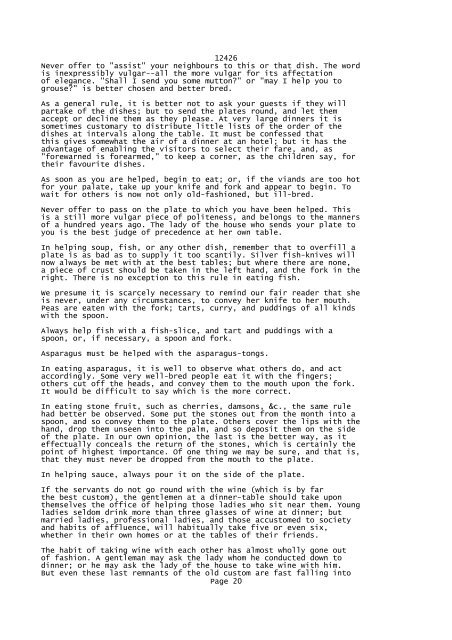12426 - Notepad - University of Macau Library
12426 - Notepad - University of Macau Library
12426 - Notepad - University of Macau Library
Create successful ePaper yourself
Turn your PDF publications into a flip-book with our unique Google optimized e-Paper software.
<strong>12426</strong><br />
Never <strong>of</strong>fer to "assist" your neighbours to this or that dish. The word<br />
is inexpressibly vulgar--all the more vulgar for its affectation<br />
<strong>of</strong> elegance. "Shall I send you some mutton?" or "may I help you to<br />
grouse?" is better chosen and better bred.<br />
As a general rule, it is better not to ask your guests if they will<br />
partake <strong>of</strong> the dishes; but to send the plates round, and let them<br />
accept or decline them as they please. At very large dinners it is<br />
sometimes customary to distribute little lists <strong>of</strong> the order <strong>of</strong> the<br />
dishes at intervals along the table. It must be confessed that<br />
this gives somewhat the air <strong>of</strong> a dinner at an hotel; but it has the<br />
advantage <strong>of</strong> enabling the visitors to select their fare, and, as<br />
"forewarned is forearmed," to keep a corner, as the children say, for<br />
their favourite dishes.<br />
As soon as you are helped, begin to eat; or, if the viands are too hot<br />
for your palate, take up your knife and fork and appear to begin. To<br />
wait for others is now not only old-fashioned, but ill-bred.<br />
Never <strong>of</strong>fer to pass on the plate to which you have been helped. This<br />
is a still more vulgar piece <strong>of</strong> politeness, and belongs to the manners<br />
<strong>of</strong> a hundred years ago. The lady <strong>of</strong> the house who sends your plate to<br />
you is the best judge <strong>of</strong> precedence at her own table.<br />
In helping soup, fish, or any other dish, remember that to overfill a<br />
plate is as bad as to supply it too scantily. Silver fish-knives will<br />
now always be met with at the best tables; but where there are none,<br />
a piece <strong>of</strong> crust should be taken in the left hand, and the fork in the<br />
right. There is no exception to this rule in eating fish.<br />
We presume it is scarcely necessary to remind our fair reader that she<br />
is never, under any circumstances, to convey her knife to her mouth.<br />
Peas are eaten with the fork; tarts, curry, and puddings <strong>of</strong> all kinds<br />
with the spoon.<br />
Always help fish with a fish-slice, and tart and puddings with a<br />
spoon, or, if necessary, a spoon and fork.<br />
Asparagus must be helped with the asparagus-tongs.<br />
In eating asparagus, it is well to observe what others do, and act<br />
accordingly. Some very well-bred people eat it with the fingers;<br />
others cut <strong>of</strong>f the heads, and convey them to the mouth upon the fork.<br />
It would be difficult to say which is the more correct.<br />
In eating stone fruit, such as cherries, damsons, &c., the same rule<br />
had better be observed. Some put the stones out from the month into a<br />
spoon, and so convey them to the plate. Others cover the lips with the<br />
hand, drop them unseen into the palm, and so deposit them on the side<br />
<strong>of</strong> the plate. In our own opinion, the last is the better way, as it<br />
effectually conceals the return <strong>of</strong> the stones, which is certainly the<br />
point <strong>of</strong> highest importance. Of one thing we may be sure, and that is,<br />
that they must never be dropped from the mouth to the plate.<br />
In helping sauce, always pour it on the side <strong>of</strong> the plate.<br />
If the servants do not go round with the wine (which is by far<br />
the best custom), the gentlemen at a dinner-table should take upon<br />
themselves the <strong>of</strong>fice <strong>of</strong> helping those ladies who sit near them. Young<br />
ladies seldom drink more than three glasses <strong>of</strong> wine at dinner; but<br />
married ladies, pr<strong>of</strong>essional ladies, and those accustomed to society<br />
and habits <strong>of</strong> affluence, will habitually take five or even six,<br />
whether in their own homes or at the tables <strong>of</strong> their friends.<br />
The habit <strong>of</strong> taking wine with each other has almost wholly gone out<br />
<strong>of</strong> fashion. A gentleman may ask the lady whom he conducted down to<br />
dinner; or he may ask the lady <strong>of</strong> the house to take wine with him.<br />
But even these last remnants <strong>of</strong> the old custom are fast falling into<br />
Page 20

















